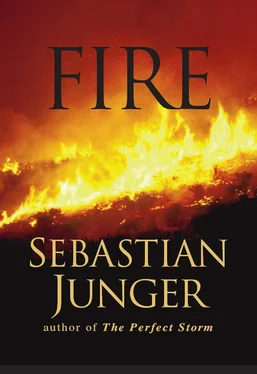I drive to Pyla on a beautiful early-spring day with the tree buds suddenly opening up and the Mediterranean sparkling blue and flawless in the distance. Pyla looks like every other farming town in the area, a cluster of small stone houses and cheap apartment blocks set amid the stubbornly uninteresting fields of eastern Cyprus. There are no checkpoints on the road into town and no policemen to show my papers to, so I just drive in and park in the main square. There is a Greek café on one side, a Turkish café on the other, and a UNFICYP observation tower in the middle. On a nearby hill are a Turkish machine-gun position and a huge metal cutout of Atatürk in profile, striding down the slope into town.
Since there is open access on both sides, Scott has decided to meet me here for a drink, and as soon as I step out of the car, he comes walking up and shakes my hand. I’m worried that after a week of Turkish propaganda he’ll start gibbering about Greek atrocities, but he seems unchanged. He’s been here for an hour and has already arranged an interview with the Turkish mayor, or mukhtar, so we cross the square and step into a street-level office with a big plate-glass window. The mukhtar’s name is Mehmet Sakali. He wears an old blue suit, frayed at the cuffs, and a black wool sweater over a shirt and tie. His shoes need resoling, and he has the kind of leathery skin that you usually see on farmers or ranch hands. Scott asks how relations are between the two communities.
“Not so well,” he says. “No Turks go to Greek Cypriot coffee shops and no Greek Cypriots go to Turkish coffee shops. If a Greek comes and talks to a Turk, the spies in town will interrogate them. Day by day, they try to keep the people apart.”
“How were relations before?”
“They were fine until 1958,” the mayor says. “Then EOKA started killing people.”
Scott and I have been told that the UN awarded Pyla a one-million-dollar renovation grant several years ago, but the town lost the money because no one could agree on how to spend it. It was an important moment, because a successful collaboration would have served as a model for the rest of Cyprus. And bicommunal activities, as they’re called, would greatly help the Greek Cypriots’ case for being accepted into the European Union, something they have lobbied for energetically over the loud objections of the Turkish Cypriots. Scott asks him what happened.
“We built a coffee shop and a church with the money,” says Sakali, “but we can’t agree on anything else because the Greeks insisted on all Greek workers. I’ve worked with three other Greek mukhtars, but now the Cyprus government is getting into everything and it’s no good. We’ve set up meetings ten times, and each time this mukhtar has refused to come or has sent his town clerk. So how can I trust him?”
Scott gives me a baleful stare, which I ignore. After the interview we have a drink at the Greek Cypriot café, and then Scott leaves town and I go to talk to the Greek Cypriot mayor. He’s not in, but the town clerk is, a clean-shaven young man named Stavrous Stavron. He offers me a seat in his gleaming new office and asks me what I need to know. I repeat the same questions we asked the Turkish mayor, starting with relations between the two sides.
“It depends on what you’re looking at,” he says. “You can see neighbors living together peacefully and you can see a village coming into conflict. It’s intervention from the outside—by that I mean the politicians—that causes tension. The last year has been very difficult because the new [Turkish] mayor is a protégé of the extremists.”
I tell him that the “new mayor”—Sakali—says the deal fell through because the Greek Cypriot mayor kept refusing to meet with him. Stavron shakes his head. “We ended up employing three Greek Cypriots to repair the Orthodox church and twelve Turkish Cypriots to renovate the Turkish coffee shop. Both projects were finished successfully, but then there were elections on the Turkish side and the new mukhtar won without any opposition. The old mukhtar was forced to not be a candidate; that’s what I mean by ‘outside influence.’”
It seems that Sakali—presumably a puppet of the Denktash regime—sabotaged the project by insisting on complete Turkish control, which of course the Greek Cypriots couldn’t accept. After using only one hundred thousand dollars of the million-dollar grant, Pyla had to relinquish the rest because the two sides could not come to an agreement. That each side would pass up nearly a million dollars in order to make the other side look bad is a devastating comment on the political leadership in Cyprus. If they can’t cooperate here—in a fully integrated town that is crippled by unemployment—what chance do they have anywhere else?
“The old mukhtar was fair,” Stavron adds wistfully. “He was a Turk—we knew he was a Turk; we knew we could never turn him into a Greek—but we appreciated his cooperation.”
I thank Stavron for his time and walk back across the square. I have the impression that every person in town knows that Scott and I have been here and that half of them are still watching me through their window slats. I drive out to a Turkish restaurant for some of the fresh fish that Pyla is famous for. The meal is good but not good enough to make a town famous. I eat quickly and get back into the car. Dark clouds are rolling off the Troodos, and by the time I hit the highway a heavy cold rain is washing my windshield.
The Greek Cypriots can never win, I think, racing northwest toward Nicosia. The only thing that will bring stability to the island is a gradual meshing of the economies, and neither side will let that happen. The Greek Cypriots have stubbornly resisted doing any business with the TRNC because that would indirectly support the Denktash regime, and the TRNC has made it an unspoken policy to sabotage any budding relationship between the two countries. If peace came to Cyprus, the Greek Cypriots would become eligible for membership in the European Union, and that is something that Turkey—which has been rebuffed by the EU—could never accept. The only way out for the Greek Cypriots would be to recognize the TRNC diplomatically and declare the hostilities over, but that will never happen. Even acceptance into the EU isn’t worth that.
And so the conflict groans on, and the peacekeepers keep walking their patrols.
“All the politicians in the south have been around since before independence,” explains a prominent Greek Cypriot journalist (who, to my frustration, months later, requests that he not be identified, a reversal that testifies to the stifling paranoia of Cypriot politics). I seek him out the day after returning from Pyla. “They’ve made a career out of being defiant,” he goes on. “These are the same guys who lost the war in ’74…. They’re prisoners of their own rhetoric; they know fuck-all about anything apart from the Cyprus problem.”
The journalist is old enough to be part of the last generation to have any memory of the Turkish invasion. Anyone younger effectively grew up without contact with Turkish Cypriots and knows only what the government says about them. Clearly, he is tired of hearing it.
“No one will go on record and say it,” he says, “but now your average man on the street would say, ‘Why don’t we just build a wall?’”
“Literally build a wall?”
“Yeah, a big wall, them on that side, us on this side,” he says. “And we don’t want to see them ever again.”
Afterward I walk downtown for lunch. The weather has cleared, and English tourists are again out in force. They wander in and out of Gucci and Benetton shops and sit at cafés with their faces turned to the sun. A few blocks away, thousands of Turkish troops wait in bunkers for their orders to attack. It’ll never happen, I think. They already have what they want.
Читать дальше












